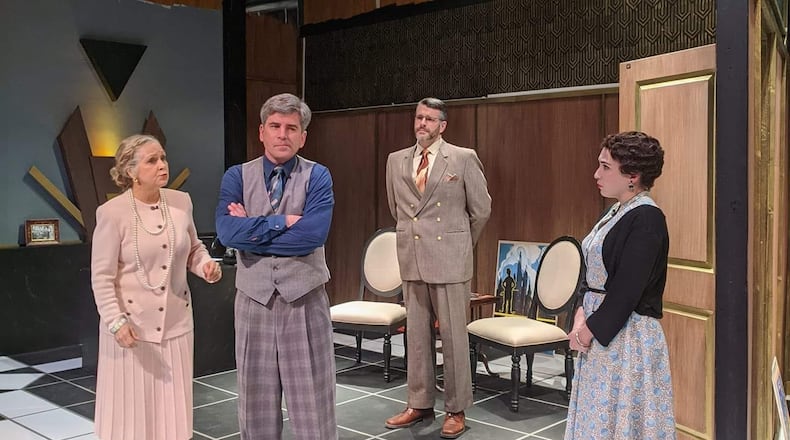“The play is so timely,” said director Jennifer Lockwood, who staged “The Man Who Came to Dinner” for the Playhouse last season. “(It covers) political satire vs. free speech, business concerns and jobs vs. taking a stand and standing up for oppressed peoples and against the oppressors. (But) even as it deals with serious topics, the script is full of humor. I think people need that right now.”
“The script is really smart,” echoed Playhouse Board Chairperson Matt Lindsay, who reprises his role as Chaplin. “There’s not a single character moment that doesn’t come around again as the drama unfolds. Also, while there’s a lot of history communicated, because it’s woven into several characters’ lines, it doesn’t feel heavy handed. I (also) appreciate that Charlie’s happy ending is leavened by the less than happy realities of war.”
Chaplin’s artistic success with “The Great Dictator,” the second-highest grossing film of 1940, is evident in its five Academy Award nominations including Best Picture, Best Actor, Best Original Screenplay, and Best Original Score (composed by Meredith Willson, who eventually embraced Broadway to famously write the book, music and lyrics to “The Music Man”). Lindsay, who portrayed Atticus Finch in the Playhouse’s 2019 production of “To Kill a Mockingbird,” is especially proud to view Chaplin as the hero of the play.
“(Charlie) gets to speak up for art and against fascism and hate,” he said. “Something I hoped to accomplish was to find moments where we see Charlie as someone who rarely fails to get his way and is shocked and hurt when he doesn’t. The little boy who never grew up. Around that, it is still important to convey the play’s message about the importance of art and artists, taking risks to challenge the world to be better.”
Debra Strauss joins Lindsay from the 2015 production, helmed by Lockwood’s father Jim. In addition to being pleased to reprise Pickford, the Academy Award-winning silent film actress-turned-co-founder and chief executive of United Artists, she recognizes the impact of this period piece mirroring the present.
“I love the script because of its fascinating look at historical characters and events,” Strauss said. “The topics highlighted are amazingly relevant. The threat of the rise of fascism, antisemitism and the tyranny of powerful world leaders are topics we see in the world today. It was great being a part of this production again. It feels more powerful today than when we did it five years ago.”
As the villainous Gyssling, Mike Beerbower admits the role refreshingly offered a new experience for him. After all, his endearing tendency to play the Nice Guy illuminated the Dayton Theatre Guild productions of “All My Sons,” “Outside Mullingar” and “The Man Who Shot Liberty Valance” among others. Nonetheless, Gyssling’s complications and complexities fueled his character development.
“(Gyssling) really has to serve as a personification of Nazi Germany in all its arrogance and ugliness,” he said. “I played him as someone utterly loyal to his country, who would do his duty and advance his government’s interests even if his personal feelings might be different. He believes in German superiority and he’ll manipulate people to accomplish his mission. It’s a role within a role and I tried to have that in mind at all times, even if it’s not evident in his words and actions.”
The cast, which also includes Jenna De Gruy (marvelous opposite Beerbower in The Nerve Theatre’s “Jailbait”) as Pickford’s personal secretary Miss Hollombe, particularly rehearsed for two weeks via Zoom before gathering together to film. The day after Christmas, Lockwood tested positive for COVID-19 and quarantined. Assistant director Sarah Caplan guided the company in her absence.
“(Sarah) knew my vision and plans and just jumped in and did it,” Lockwood said. “Every single person I talked to about working on this show said yes eagerly. Not only are our audiences eager to see theatre, our artists – both onstage and off – are anxious for opportunities to create. Until we are able to safely invite audiences back in person, artists and audiences deserve to make and view art any way we can. I think audiences will really enjoy this show.”
“I’m quite proud that the Playhouse has found a way to continue to mount productions through this pandemic,” Lindsay added. “We see our mission as providing artistic opportunity for our volunteers, including technical designers, musicians and stage performers. By adapting our form, we have been able to continue that mission.”
Tickets are $20 for adults and $18 for seniors, students and military. To purchase a ticket or link to the show, visit thedaytonplayhouse.com and click on tickets. Ticket buyers will be sent a link to view the streaming video from the Dayton Playhouse Vimeo Channel on or about Monday, Jan. 25. Only one ticket is needed per household.
About the Author
